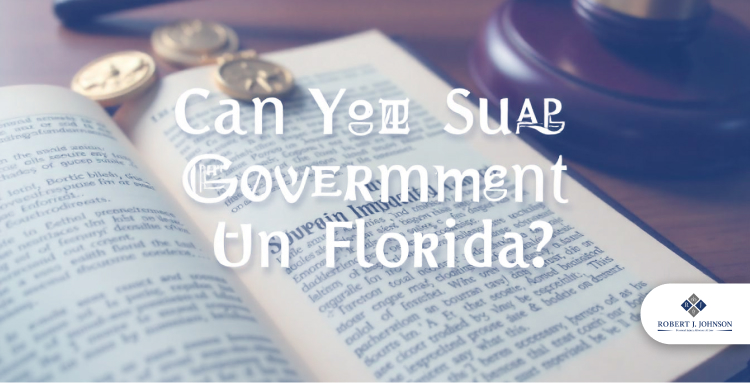
July 23, 2025
How to File a Personal Injury Claim Against a Government Entity
It starts with a stumble—maybe on a cracked sidewalk outside a government building or a fall on slippery steps that should have been maintained. In that split second, life shifts. The pain sets in, sharp and unrelenting, as you sit there, looking around for answers. How could something so routine—a walk to work, a visit to the park—turn into a moment that leaves you bruised, confused, and uncertain about what comes next?
Then the frustration creeps in. Who’s responsible for this? If you’ve been hurt because of a government entity’s negligence, you deserve answers, and you deserve the chance to rebuild what’s been lost. So where do you begin? Let’s break it down together.
1) What is Sovereign Immunity in Florida?
Sovereign immunity is a legal rule that protects the government from lawsuits in certain situations. In simple terms, it means the government can’t be sued unless it allows it. Florida Statutes Section 768.28 changes this rule. It allows people to file claims against the state or local governments if the government's negligence harms them.
For example, if a Florida state employee or a local government worker makes a mistake that causes injury, you can file a claim for compensation. However, there are limits on how much you can recover.So, while sovereign immunity generally protects the government, Section 768.28 gives people the opportunity to seek compensation in specific cases.
2) Who Can You File a Claim Against?

You can file a claim against different types of government entities in Florida, including:
State agencies
These are the departments that manage things like transportation, health, and education. For example, if the Department of Transportation fails to fix a dangerous pothole and it causes an accident, you can file a claim.
Local governments
This includes counties and cities. If a local government neglects road maintenance and you’re injured, you may file a claim.
Public employees
If a government worker, like a police officer or a maintenance worker, makes a mistake while performing their job, you might be able to hold the government responsible. For example, if a government worker causes a car accident while driving a government vehicle, you could file a claim.
3) What Are the Requirements for Filing a Claim?
Before you can file a lawsuit against the government, you must first send a Notice of Claim to the agency responsible for the issue. This notice lets the government know you plan to take legal action. If you’re dealing with a federal government issue, the U.S. Department of Justice has guidelines on how to file a claim against a federal agency.
Your notice should include:
Your contact information: This helps them get in touch with you.
A clear description of what happened: Be specific about the incident that caused your injury or damage.
The damages you're seeking: Explain what compensation you're asking for, whether it’s for medical bills, lost wages, or other costs.
Important Deadlines to Remember
There are two important deadlines to keep in mind:
Notice of Claim Deadline: You must file the notice of claim within 3 years from the date of the incident. If you don’t do this, you won’t be able to move forward with your claim.
Statute of Limitations: After you file the notice, you must also file your lawsuit within 4 years of the injury. Missing this deadline means you can’t sue for damages anymore. Want to double-check these rules? Visit Florida's Court System.
4) What Damages Can You Claim?

If you file a claim against a government entity, you can recover different types of damages, such as:
Medical expenses: This includes the cost of hospital bills, doctor visits, and treatments related to your injury.
Lost income: If your injury keeps you away from working, you can claim the wages or salary you lost because of it.
Pain and suffering: You may also be able to claim compensation for the physical and emotional pain caused due to the injury. However, there are some limits on how much you can receive for this.
Note: It’s important to know that claims against government entities in Florida have a cap. You can only recover up to $200,000 per person and $300,000 per incident. This means even if your damages exceed these amounts, you can’t claim more than these limits.
5) Steps to File a Personal Injury Claim Against a Government Entity
If you’ve been injured and believe a government agency is responsible, filing a personal injury claim in Florida is a bit different than a regular lawsuit. Here’s a simple guide to help you through the process.
Identify the Responsible Entity
First, figure out which government agency is responsible for the injury. It could be a local government, like a city or county, or a state agency like the Department of Transportation. Knowing who’s in charge is important so you know where to send your claim.
File a Notice of Claim
Before you can take legal action, you have to send a Notice of Claim to the agency responsible. This notice lets them know you plan to file a claim. It should include your contact info, details of the accident, and what kind of damages or injuries you’ve had. You have 3 years from the date of the incident to file this notice, so don’t wait too long to act.
Wait for a Response
Once you file the notice, the government has 6 months to respond. They’ll review the situation and decide whether to accept or deny your claim. If they don’t respond within that time, you can move forward with a lawsuit. Just be patient during this period and keep track of the timeline. For more on how the process works, check out the Florida Department of Legal Affairs site.
File a Lawsuit (If Necessary)
If the agency denies your claim or doesn’t get back to you in time, you can file a lawsuit. Just remember that there are special rules for suing a government entity in Florida, so make sure to follow the process carefully.
Here are some other posts worth reading:
Count on Robert J. Johnson to Win Your Personal Injury Claim Against a Government Entity

If you’ve been injured because of a government entity, Robert J. Johnson is here to help you through the process. From filing your claim to handling the steps that follow, we’re with you every step of the way. Here's how we can help you:
Figure Out Who's Responsible
We’ll help you identify which government agency is at fault for your injury, whether it’s a local city, county, or state department.
Get Your Notice of Claim Filed
We’ll make sure your Notice of Claim is properly filled out and sent on time, so you don’t miss any deadlines.
Keep Track of Important Deadlines
We’ll remind you about crucial deadlines, like when to file your Notice of Claim and the statute of limitations. We’ll ensure that you don’t lose your chance to get the compensation you deserve.
Handle the Response
If the government denies your claim or doesn’t respond within 6 months, we’ll step in and file a lawsuit if necessary.
If you have questions or need help, don’t hesitate to reach out for a free consultation.
Contact Us Now:





































































